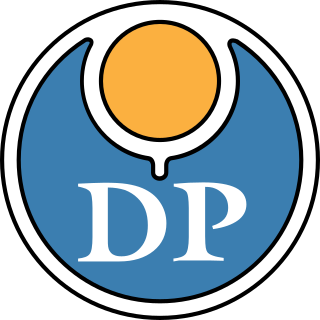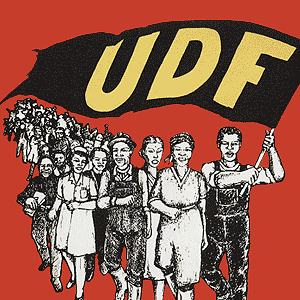Related Research Articles

The Democratic Party (DP) was a South African political party that was the forerunner of the Democratic Alliance. Although the Democratic Party name dates from 1989, the party existed under other labels throughout the apartheid years, when it was the Parliamentary opposition to the ruling National Party's policies.

The Democratic Alliance (DA) is a South African political party which is a part of the current South African Government of National Unity (GNU). The party has been the second-largest in South Africa since its foundation in 2000. The party is broadly centrist, and has been attributed both centre-left and centre-right policies. It is a member of Liberal International and the Africa Liberal Network. The DA traces its roots to the founding of the anti-apartheid Progressive Party in 1959, with many mergers and name changes between that time and the present. The DA has a variety of ideologically liberal tendencies, including neoliberalism, social liberalism, classical liberalism, and conservative liberalism. The party draws its support predominantly from Afrikaans and English speakers, people aged over 35, and white South Africans, as well as the Indian and Coloured communities.

The Progressive Federal Party (PFP) was a South African political party formed in 1977 through merger of the Progressive and Reform parties, eventually changing its name to the Progressive Federal Party. For its duration, it was the main parliamentary opposition to apartheid, instead advocating power-sharing in South Africa through a federal constitution. From the 1977 election until 1987 it was the official opposition of the country.
Liberalism in South Africa has encompassed various traditions and parties.
Frederik van Zyl Slabbert GCOB was a South African political analyst, businessman and politician. He is best known for having been the leader of the official opposition – the Progressive Federal Party (PFP) – in the House of Assembly from 1979 to 1986.

The United Democratic Front (UDF) was a South African popular front that existed from 1983 to 1991. The UDF comprised more than 400 public organizations including trade unions, students' unions, women's and parachurch organizations. The UDF's goal was to establish a "non-racial, united South Africa in which segregation is abolished and in which society is freed from institutional and systematic racism." Its slogan was "UDF Unites, Apartheid Divides." The Front was established in 1983 to oppose the introduction of the Tricameral Parliament by the white-dominated National Party government, and dissolved in 1991 during the early stages of the transition to democracy.
Floor crossing was a system introduced to the post-apartheid South African political system in 2002, under which members of Parliament, members of provincial legislatures and local government councillors could change political party and take their seats with them when they did so. Floor crossing in South Africa was abolished in January 2009.

The Afrikaner Volksfront was a separatist umbrella organisation uniting a number of right-wing Afrikaner organisations in South Africa in the early 1990s.

The apartheid system in South Africa was ended through a series of bilateral and multi-party negotiations between 1990 and 1993. The negotiations culminated in the passage of a new interim Constitution in 1993, a precursor to the Constitution of 1996; and in South Africa's first non-racial elections in 1994, won by the African National Congress (ANC) liberation movement.

Jeugkrag, also known as Youth for South Africa, was a short-lived South African youth group in the late 1980s. It was surreptitiously funded by the apartheid government's Department of Military Intelligence in an operation known as Project Essay. Led by Marthinus van Schalkwyk it operated exclusively on Afrikaans university campuses and sought to influence the political views of Afrikaans-speaking students.
Tony Trew is a South African politician and discourse analyst. He was one of the editors of the seminal book Language and control (1979), which helped establish critical linguistics as an academic field.
The South African Liberal Students' Association (SALSA) exists to unify liberal student organisations across South African campuses. SALSA is the ideological descendant of the South African Liberal Association (SALA) (1936–1968), the first non-racial political organisation in South Africa, gathering many of its liberal principles and goals in its founding constitution. SALSA is a student organisation which is not aligned with any political party; and which believes in, practices and promotes the principles of liberal democracy on campuses.
Although the Democratic Alliance of South Africa in its present form is fairly new, its roots can be traced far back in South African political history, through a complex sequence of splits and mergers.

Leon Louw is a South African intellectual, author, speaker and policy advisor. He is the executive director and cofounder of the Free Market Foundation, a nonprofit organisation ranked at number 123 in a CEOWorld's 2017 list of the most influential think-tanks in the world. He is a regularly featured speaker and writer in South African and international media. He has addressed many prominent organisations, including the US Congress hearings on apartheid, the King Center for Nonviolent Social Change, the Hoover Institute, and the United Nations.
Alexander Lionel Boraine was a South African politician, minister, and anti-apartheid activist.
Boerehaat is an Afrikaans word that means "ethnic hatred of Boers" or Afrikaners as they became known after the Second Boer War. The related term Boerehater has been used to describe a person who hates, prejudices or criticises Boers or Afrikaners.
The Dakar Conference was a historic conference between members of the Institute for Democratic Alternatives in South Africa (IDASA) and the African National Congress (ANC). It was held in Dakar, Senegal between 9 and 12 July 1987. The conference discussed topics such as strategies for bringing fundamental change in South Africa, national unity, structures of the government and the future of the economy in a free South Africa. The IDASA delegation from South Africa, participated in the conference in their private capacity and would later be condemned by the South African government for meeting a banned organization. The future indirect result of the conference was South African government talks with Nelson Mandela and his eventual meeting with P. W. Botha in 1989.
The Accord on Afrikaner self-determination is a South African political accord that recognises the right of the Afrikaner people on self-determination. The accord was signed by the Freedom Front, the African National Congress and the National Party-led South African government on 23 April 1994.
Jan Pieter de Lange was a South African educationalist, chairman of the Afrikaner Broederbond, and a negotiator.

Luyolo Mphithi is a South African politician who has been a Member of the National Assembly of South Africa since 2019. A member of the Democratic Alliance, he served as Shadow Minister of Women, Youth and Persons with Disabilities in the Presidency from 2019 to 2023 and the Shadow Minister of Human Settlements from 2023 to 2024. Mphithi served as the Federal Leader of the DA's youth organisation from 2018 until his resignation in 2022. Luyolo Mphithi was elected as Vice President of the African Liberal Youth for democracy in Dakar, Senegal in 2022. He also serves as a Bureau Regional member of the International Federation of Liberal Youth (IFLRY).
References
- ↑ Battersby, John D. (21 February 1988). "South Africa's Liberals: Divided and Dropping Out". The New York Times. Retrieved 18 August 2016.
- 1 2 3 4 5 6 Giliomee, Hermann (2013). The Last Afrikaner Leaders: A Supreme Test of Power. Virginia: University of Virginia Press. p. 448. ISBN 9780813934952.
- 1 2 3 4 5 6 7 8 9 10 11 12 13 14 McGann, James G. (2010). Democratization and Market Reform in Developing and Transitional Countries: Think Tanks as Catalysts. Routledge. p. 272. ISBN 9781135224936.
- 1 2 Giliomee, Hermann. "True Confessions, End Papers and the Dakar conference: A review of the political arguments" (PDF). University of Pretoria. Archived from the original (PDF) on 13 October 2016. Retrieved 1 August 2016.
- ↑ Hopkins, Pat (2006). Voëlvry: The Movement that Rocked South Africa. Zebra. p. 239. ISBN 9781770071209.[ permanent dead link ]
- 1 2 3 4 5 Jaster, Robert Scott (2016). South Africa's Other Whites: Voices for Change. Springer. p. 151. ISBN 9781349224562.
- 1 2 Hearn, Julie (October 2000). "Aiding Democracy? Donors and Civil Society in South Africa". Third World Quarterly. 21 (5): 815–30. doi:10.1080/713701079. JSTOR 3993620. S2CID 145606607.
- 1 2 3 Neo-liberalism and Democracy: The Role of Intellectuals in South Africa’s “Democratic Transition”, Ian Taylor, Political Cultures in Democratic South Africa, Edited by Henning Melber, Nordiska Afrikainstitutet, Uppsala, 2002
- ↑ Robinson, William I. (1996). Promoting Polyarchy: Globalization, US Intervention, and Hegemony. Cambridge: Cambridge University Press
- 1 2 Mutua, Makau (2013). Human Rights NGOs in East Africa: Political and Normative Tensions. University of Pennsylvania Press. p. 400. ISBN 9780812203936.
- ↑ Gidron, Benjamin; Katz, Stanley N.; Hasenfeld, Yeheskel (2002). Mobilizing for Peace: Conflict Resolution in Northern Ireland, Israel/Palestine, and South Africa. Oxford University Press. p. 304. ISBN 9780198029106.
- ↑ Jones, Lena. "Fellowship Report (2004)". Humans Rights Centre - University of Minnesota. Retrieved 18 September 2016.
- 1 2 3 "Idasa not to appeal party-funding judgement". Mail&Guardian. SAPA. 9 May 2005. Retrieved 18 September 2016.
- ↑ Pressly, Donwald (9 February 2005). "Idasa goes to court over party donations". Mail&Guardian. Retrieved 18 September 2016.
- ↑ "Idasa celebrates 20 years of building democracy". Mail&Guardian. SAPA. 12 July 2007. Retrieved 18 September 2016.
- 1 2 3 4 Calland, Richard (28 March 2013). "The perfect storm that shut down Idasa". Mail&Guardian. Retrieved 21 August 2016.
- ↑ O'Riordan, Alexander (27 March 2013). "Idasa's Demise, Broken Donor Promises and Africa's Naive Civil Society". The South African Civil Society Information Service. Retrieved 22 August 2016.
- ↑ Robinson, William I. (1996). Promoting Polyarchy: Globalization, US Intervention, and Hegemony. Cambridge: Cambridge University Press.